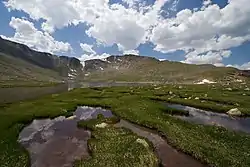Summit Lake Park
Summit Lake Park is a park located along Mount Evans Scenic Byway about 64 miles (100 km) west of Denver, Colorado. The park is 160 acres (0.65 km²) in size and contains alpine tundra. Land to the east of the lake is in a state of permafrost which helps to prevent drainage of the area.[2] During the summer, the park is filled with wildflowers, some of which have not been found anywhere else outside of the Arctic Circle.[3] The park is named after Summit Lake, the headwaters of Bear Creek.
Summit Lake Park | |
 Summit Lake Park | |
| Location | Clear Creek County, Colorado, USA |
|---|---|
| Nearest city | Idaho Springs, CO |
| Coordinates | 39°35′55″N 105°38′39″W |
| Built | 1924 |
| Architect | Benedict, Jules Jacques Benoit; CCC |
| MPS | Denver Mountain Parks MPS |
| NRHP reference No. | 95000110 [1] |
| Designated | April 1965 |
| CSRHP No. | 5CC.645 |
| Added to NRHP | February 24, 1995 |
Summit Lake
Summit Lake is a tarn which sits at 12,836 feet (3,912 m) elevation in a glacial cirque on the north face of Mount Blue Sky and the east face of Mount Spalding. To the north, there is a col (12,855 feet/3918 m elevation) looking down into the chain of two cirques holding the Chicago Lakes at the headwaters of Chicago Creek.[4] By one count that includes several unnamed lakes, Summit Lake is the 13th highest lake in the United States.[5] In 1915, the USGS reported that Summit Lake was the highest lake in Colorado, at 12,740 feet.[6] Later secondary sources occasionally report it as the highest lake in the United States.[7]
The land was acquired by Denver in 1924 and incorporated into the Denver Mountain Parks system.[3] It was declared a National Natural Landmark in April, 1965.[8]
See also
References
- "National Register Information System". National Register of Historic Places. National Park Service. March 15, 2006.
- "Driving and Watching for Alpine Wildlife - On Mount Blue Sky". June 14, 2006. Retrieved September 22, 2006.
- The City and County of Denver. "Denver Mountain Parks - Summit Lake Park". Retrieved October 30, 2011.
- Summit Lake on The National Map Viewer Archived 2008-06-02 at the Wayback Machine from the USGS.
- Carl Drews, The Highest Lake in the United States of America, 2004.
- R. B. Marshall, Appendix B, Secondary Elevations, Results of Spirit Leveling in Colorado, 1896 to 1914, Inclusive, Bulletin 565, United States Geological Survey, Government Printing Office, 1915; page 186.
- Michael Martin and Leonard Gelber, Colorado,Dictionary of American History, Philosophical Library, 1978; page 132.
- "National Natural Landmark summary". National Park Service. February 5, 2004. Retrieved May 10, 2009.